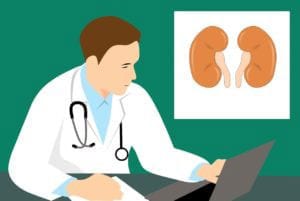Glomerulonephritis
What is glomerulonephritis?
Glomerulonephritis is a kidney disease caused by inflammation of the glomeruli, the part of the kidney that filters out extra waste and fluids from the bloodstream. Normally waste passes harmlessly out of the body through urine, but in patients with glomerulonephritis, the waste accumulates in the body and cause complications such as kidney damage and failure, high blood pressure, and nephrotic syndrome. Inflammation from glomerulonephritis is either acute—meaning it occurs suddenly—or chronic—meaning it builds up gradually over time. In the most extreme cases, inflammation happens very quickly and kidney function is lost in a matter of weeks or months: This is called rapidly progressive glomerulonephritis. There is not a glomerulonephritis “demographic”—anyone can be diagnosed with it—but prior health history is sometimes a good indicator of risk. Glomerulonephritis is often the result of a problem with the body’s immune system. Other times, it’s the result of a viral or bacterial infection. And in some cases, the cause is simply unknown. That makes predicting or preventing the disease difficult, if not impossible. But there are a few things you can do to reduce your risk:- Treat strep infections promptly, especially if they involve a sore throat or a rare type of skin infection called impetigo
- Avoid risky behaviors (e.g., unprotected sex, intravenous drug use) that can expose you to a serious viral infection
- Avoid high blood pressure
- If you have diabetes, follow your doctor’s directions to control your blood sugar
- If you have kidney disease, follow your doctor’s directions to maintain a healthy weight and diet
- If you have any other immune disease or condition that might cause glomerulonephritis, take all your medications as prescribed and follow all your doctor’s directions
What are the symptoms of glomerulonephritis?
Glomerulonephritis symptoms differ depending on the underlying cause of the disease and whether the inflammation is chronic or acute. Some possible symptoms include:- Blood in the urine, or urine with a pink or “cola” color
- Foamy urine
- Excessive urination
- Blood in vomit or stools
- Diarrhea
- High blood pressure
- Swelling in face, eyes, hands, ankles, feet, legs, or abdomen
- Abdominal pain
- Loss of appetite
- Fever
- Fatigue
- Cough or shortness of breath
- Joint or muscle aches
- Nosebleed
How is glomerulonephritis diagnosed?
There are a few ways to get a glomerulonephritis diagnosis. One is to be on the lookout for specific signs and symptoms, but a more effective approach would be to conduct a urinalysis. A urinalysis can detect abnormalities that suggest a deeper problem, like excess red blood cells (which indicate damage to the glomeruli), white blood cells (which indicate infection or inflammation), and higher protein levels (which indicate nephron damage). In addition to urinalysis, doctors may also conduct tests to assess kidney function. Measuring the amount of waste products in the blood (e.g., creatinine) can point to possible kidney or glomeruli damage, and X-rays or CT scans can visualize that damage. Based on the results of blood and imaging tests, doctors will need to perform a kidney biopsy to pinpoint the cause of any inflammation and confirm a glomerulonephritis diagnosis.What treatments are available for glomerulonephritis?
Because glomerulonephritis impacts the kidneys’ ability to filter waste, it’s important to start on treatment as soon as possible. The primary goal of glomerulonephritis treatment is preventing kidney damage. There are no medications specifically for glomerulonephritis, but if another disease, virus, or infection is responsible for the condition, treating the underlying cause may help reduce glomeruli inflammation. These treatments can range from antibiotics and immunosuppressants to supplements and even plasmapheresis (the process of mechanically removing antibodies from the blood). Preventing high blood pressure is a key part of preserving kidney function, so doctors may also prescribe different blood pressure medications. In some acute glomerulonephritis cases associated with a strep infection, symptoms may resolve on their own. But if the damage is so severe that the kidneys have started to fail, kidney transplant or dialysis may be the only options.Where can I find more information on glomerulonephritis?
Glomerulonephritis Articles

A MCD Diagnosis Story: Why Listening to Your Body is so Critical
Trudy Horsting
April 8, 2022
Read More »


Learn More About Membranous Glomerulonephritis, a Rare Kidney Disease
Kendall Mason
February 3, 2021
Read More »

Pegcetacoplan Registrational Programs Begun for C3G, ALS, and IC-MPGN
Jessica Lynn
October 13, 2020
Read More »
-300x300.jpg)

Paroxysmal Nocturnal Hemoglobinuria Investigative Therapy Moving to Phase 3 Trial in 2020
Trudy Horsting
December 30, 2019
Read More »

A New Potential Drug Target for Inflammatory Diseases such as Ulcerative Colitis Discovered
Trudy Horsting
May 28, 2019
Read More »

New Drug Approved in the EU for Treating Hereditary Transthyretin Amyloidosis
James Moore
July 13, 2018
Read More »




